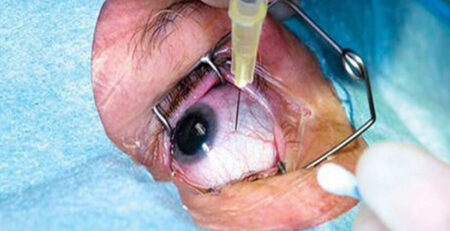What is Retinal Detachment?
Our eyes are the windows to the world, allowing us to see and experience the beauty around us. However, it can be a terrifying experience when something goes wrong with them. One such condition is retinal detachment, which can lead to permanent vision loss if left untreated.
This happens when the thin layer of tissue at the back of the eye (the retina) becomes detached from the underlying tissue, disrupting the normal flow of visual information and potentially causing permanent vision loss.
If you or a loved one is experiencing any of these symptoms, it’s important to seek the advice of the best eye specialist in Delhi as soon as possible.
What is Retinal Detachment?
Retinal detachment is a serious eye condition in which the retina, a thin layer of tissue that lines the back of the eye, separates from its normal position. The detachment can occur suddenly or gradually, leading to vision loss if not treated promptly.
The retina detects light and sends signals to the brain, allowing us to see. When it detaches, it can no longer function properly, leading to blurred or distorted vision, blind spots, or a complete loss of sight.
Retinal detachment is of different types. The most common is Rhegmatogenous retinal detachment. This occurs due to tears forming in the retina due to various reasons, including high minus number, trauma to the eye, certain medical conditions like diabetes, or as a result of ageing. Early diagnosis with the best eye specialist in Delhi and treatment of retinal detachment is essential to prevent permanent vision loss. Treatment typically involves surgery to reattach the retina and prevent further separation.
Types of Retinal Detachment
There are three main types of retinal detachment:
1- Rhegmatogenous Retinal Detachment
This is the most common type of retinal detachment and occurs when a tear or hole in the retina allows fluid to pass through and accumulate between the retina and the underlying tissue. This accumulation of fluid can cause the retina to detach.
2- Tractional Retinal Detachment
This type of retinal detachment occurs when scar tissue or other abnormal growth on the retina’s surface pulls the retina away from the underlying tissue. Tractional retinal detachment is often associated with conditions such as diabetic retinopathy, vascular occlsions and sickle cell disease.
3- Exudative Retinal Detachment
This type of retinal detachment occurs when fluid leaks into the area behind the retina, causing it to separate from the underlying tissue. Exudative retinal detachment is often associated with conditions such as age-related macular degeneration, inflammatory disorders, and tumours.
The best eye doctor in Delhi can help you to determine the type and cause of the condition.
How Does Retinal Detachment Develop?
1- Rhegmatogenous Retinal Detachment
Rhegmatogenous Retinal detachment occurs when the fluid seeps through retinal holes or tears and collects behind the retina. Retinal tears are formed due to various factors.
Vitreous Detachment: The most common cause of retinal detachment is vitreous detachment, which occurs when the vitreous gel inside the eye separates from the retina. This can cause a tear or hole in the retina, which allows fluid to seep underneath and lift the retina away from its support tissue.
Trauma: A direct injury to the eye or head can cause a tear or hole in the retina, leading to detachment.
Myopia: People who are severely nearsighted are at a higher risk of retinal detachment because their eyes are longer and the retina is stretched thinner.
Age-Related Changes: As we age, the vitreous gel that fills the eye can shrink and pull away from the retina, causing it to tear or detach.
Genetics: Retinal detachment can run in families, so people with a family history of the condition may be more likely to develop it.
Previous Eye Surgery: People with certain types of eye surgery, such as cataract surgery, are at a higher risk of developing retinal detachment.
2- Tractional Retinal Detachment
Occurs due to retinal vascular conditions like diabetic retinopathy, vascular occlusion, vasculitis and uveitis.
3- Exudative Retinal Detachment
Conditions like central serous retinopathy, uveitis and many retinal tumors are factors that can cause exudative retinal detachment.
Signs and Symptoms of Retinal Detachment
Retinal detachment can cause a range of symptoms, which can vary depending on the type and severity of the detachment. Some common signs and symptoms of retinal detachment include:
- The sudden appearance of floaters: These are specks or dots that appear to float across your field of vision.
- You may see sudden flashes of light in your peripheral vision.
- Blurred vision
- Sometimes, you may experience a sudden, total loss of vision.
If you are experiencing these symptoms, it’s time to consult the best eye specialist in Delhi for diagnosis.

Treatment for Retinal Detachment
The treatment for retinal detachment depends on the type and severity of the detachment. In most cases, treatment involves surgery to reattach the retina and prevent further damage to your vision. Some common treatments for retinal detachment include:
Photocoagulation (Laser Barrage)
The best eye doctor in Delhi uses photocoagulation, also known as laser barrage, to treat small tears or holes in the retina that are not yet causing detachment. It can also treat certain retinal disorders, such as diabetic retinopathy or macular degeneration.
During photocoagulation, the experienced ophthalmologist, Dr Anisha Gupta, uses a special type of laser to create small burns on the retina, which help to seal any leaks or tears and prevent further detachment.
Laser barrage is typically performed in an outpatient setting and may take anywhere from 10 minutes to an hour to complete, depending on the extent of the detachment. Before the procedure, your eye will be numbed with anaesthetic eye drops to minimise any discomfort.
Cryopexy
Cryopexy is a medical procedure where a special freezing probe creates a scar around a retinal tear or hole. The scar helps to seal the tear or hole and prevent further detachment.
Surgery
If a significant portion of the retina is detached, the best eye specialist in Delhi may recommend surgery to reattach the retina. There are three common surgical procedures used to treat retinal detachment: pneumatic retinopexy, scleral buckling, and vitrectomy.
a- Pneumatic Retinopexy
Pneumatic retinopexy is a surgical procedure used to treat certain cases of retinal detachment. It is a minimally invasive procedure that can be performed on an outpatient basis, which means that the patient can go home the same day as the procedure.
During the procedure, the best eye specialist in Delhi injects a gas bubble into the vitreous cavity using a small needle. The patient is then positioned so the bubble can press against the detached part of the retina. Once the gas bubble is in the right position, Dr Anisha Gupta uses a laser or freezing treatment to seal the retinal tear or hole. Over time, the gas bubble is absorbed by the body and is replaced by natural eye fluid.
b- Scleral Buckling
Scleral buckling involves the placement of a silicone band, called a scleral buckle, around the eye to support the detached retina and prevent further detachment.
During the procedure, Dr Anisha Gupta, the best ophthalmologist in Delhi, makes a small incision in the eye and places the silicone band around the eye. The band is then tightened to apply pressure to the sclera, which pushes the wall of the eye inward and helps to reposition the detached retina. Dr Anisha Gupta, the best ophthalmologist, may also use cryotherapy (freezing treatment) or laser treatment to seal any retinal tears or holes.
c- Vitrectomy
Vitrectomy is a surgical procedure that involves the removal of the vitreous gel from the eye and replacing the gel with a gas bubble or silicon oil. The gas/oil bubble helps to push the retina back into place and keep it in position while it heals. The patient may need to maintain a particular position for some days.
Treatment of cause in case of Exudative retinal detachment
The cause of fluid collection has to be corrected to cure exudative retinal detachment.
Conclusion
Retinal detachment is a serious eye condition that can lead to vision loss and blindness if not treated promptly. If you experience symptoms such as floaters, flashes of light, or a curtain over your vision, it’s important to seek medical attention immediately.
Dr Anisha Gupta, the best eye specialist in Delhi, is a highly skilled and experienced ophthalmologist specialising in diagnosing and treating retinal detachment. With her expertise and state-of-the-art technology, she can provide personalised and effective treatment options to help restore your vision and prevent further complications.
Your eyesight is too precious to delay seeking help. So, don’t let retinal detachment take away your vision. Contact Dr Anisha Gupta today to schedule a consultation and learn more about your treatment options.











